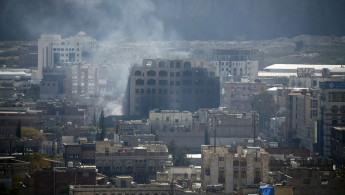Yemen government orders Sanaa offensive as Saleh's house destroyed in capital
Yemen's president has ordered his forces to retake Sanaa from Houthi rebels, after the insurgents reportedly destroyed the home of former ally and ex-president Ali Abdullah Saleh.
An official from Abedrabbo Mansour Hadi's office told AFP on Monday that he has ordered Vice President Ali Mohsen al-Ahmar, who is in Marib, to activate military units and advance toward the capital.
The order came as a three-year alliance between the Iran-backed Houthis and forces loyal to ex-president Saleh collapsed into gun battles in Sanaa.
Earlier on Monday, Hadi's internationally-recognised government said it would grant amnesty to anyone who cuts ties with Houthi rebels.
The move targets former Saleh, whose alliance with the rebels has collapsed.
Sanaa residents told Reuters that Houthi rebels blew up Saleh's home in the centre of the capital on Monday, as his whereabouts remain unknown.
The Houthi-run Ansar Allah Media Centre on Tuesday released images allegedly taken from inside Saleh's residence in the capital, suggesting the rebels had seized the property.
Yemeni human rights activist Abdel Rabb al-Yafei said in an online statement that Saleh fled his home before the rebels stormed the property and blew it up after looting it.
Conflicting reports have emerged about the fate of Saleh, with a number of regional media outlets opposed to him saying that he has been killed.
Sources from his General People's Congress (GPC) party have denied the reports.
Sanaa residents told The New Arab that fierce clashes between Houthi rebels and Saleh supporters began early on Monday in the city's close to the former leader's residence.
A wave of air raids rattled Sanaa on Monday, as clashes also spread beyond Sanaa.
The strikes appeared to hit targets near Sanaa International Airport and the interior ministry, both under the control of the Houthi rebels, according to residents and a source inside the airport.
A military coalition led by Saudi Arabia is the only party in the Yemen war known to conduct air raids on Sanaa.
Fighting erupted between the rebels and forces loyal to Saleh last week, unravelling their fragile alliance, formed in the face of the internationally-recognised government and Saudi-led coalition.
Saleh on Saturday announced he was open to talks with Saudi Arabia and its allies on condition they ended their crippling blockade on Yemen's ports and airports - dealing a serious blow to his already fragile alliance with rebel chief Abdul Malik al-Houthi.
Since 2014, Sanaa has been ruled under an agreement between Saleh and the Houthis, who drove the Hadi government out of the capital, set up their own government and for two years together fought the Saudi-led coalition.
The Saleh-Houthi split has sparked fears of a new front in the Yemen war, which has already claimed more than 8,750 lives since the Saudi-led coalition joined the war to support the Hadi government.
The conflict has pushed Yemen to the brink of mass starvation and triggered what the United Nations has called the world's worst humanitarian crisis.





 Follow the Middle East's top stories in English at The New Arab on Google News
Follow the Middle East's top stories in English at The New Arab on Google News
![Israeli forces ordered bombed Gaza's Jabalia, ordering residents to leave [Getty]](/sites/default/files/styles/image_330x185/public/2176418030.jpeg?h=a5f2f23a&itok=_YGZaP1z)

